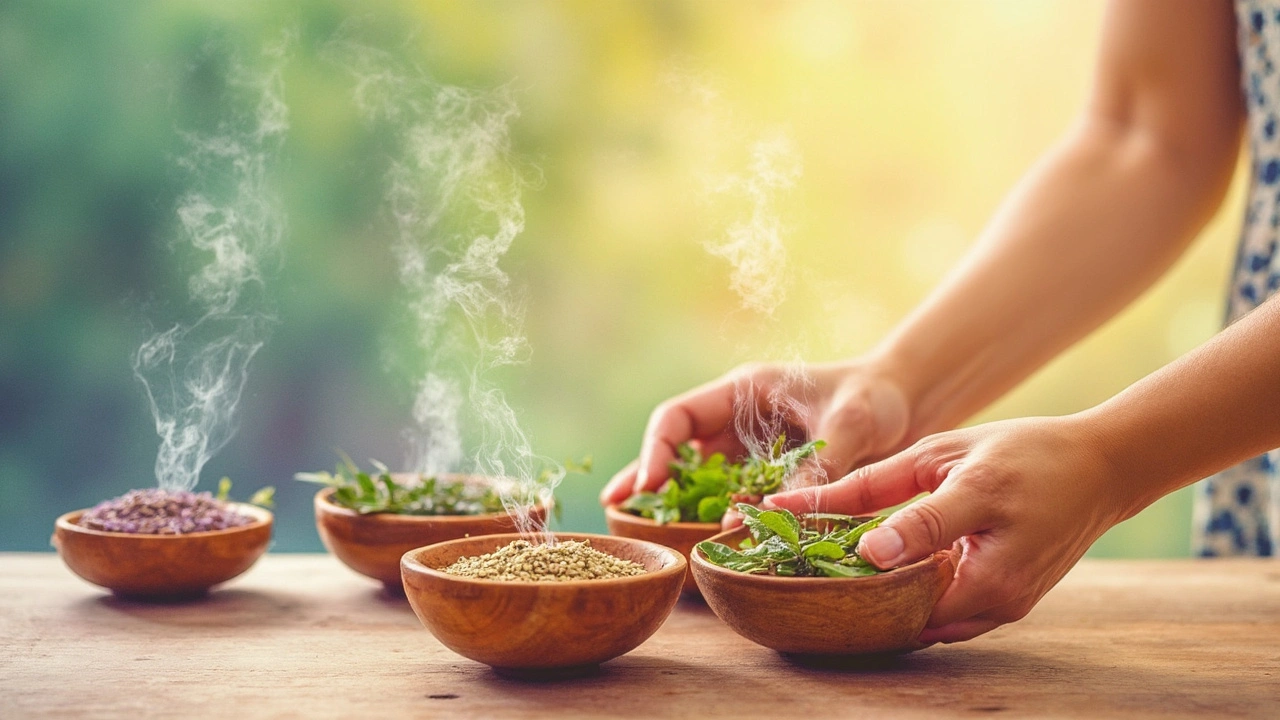Living with chronic pain isn’t just about the physical aches—it drains your energy, messes with your mood, and basically hijacks your life. Lots of folks bounce from one pain relief trick to the next, but aromatherapy massage keeps popping up for a reason. It’s not only about zone-out relaxation—there’s real science behind why those plant oils and skilled hands can help dial down pain.
If you’ve never tried it, think of aromatherapy massage as a mix between classic massage and the power of essential oils. When you breathe in those scents and your skin soaks up the oils, your brain and body both get the message to chill out. The result? Less tension, better mood, and yes, less pain for many people.
But is it all hype, or does it actually make a difference for people dealing with real pain day after day?
- How Aromatherapy Massage Works
- What Science Says About Pain Relief
- Essential Oils That Truly Help
- Tips for Getting the Most from Your Session
- When Aromatherapy Might Not Be Enough
How Aromatherapy Massage Works
At first glance, an aromatherapy massage looks a lot like your average massage. The difference? The therapist mixes in essential oils—like lavender, eucalyptus, or peppermint—chosen to match what you’re dealing with, like pain or stress. These aren’t just pretty smells; each oil delivers real benefits when it hits your skin or you breathe it in.
Here’s what actually happens during a session:
- The therapist blends specific essential oils into a base oil—something simple like almond or grapeseed oil—at a safe concentration (usually about 2-3% essential oil, so your skin doesn’t freak out).
- They rub the blend into your skin during the massage, hitting spots that are tight or sore, and helping the oils absorb.
- At the same time, the massage boosts blood flow and gets rid of muscle knots. While your muscles get a break, your brain also gets a nudge to chill from the scent and the touch.
Smell isn’t just about comfort. When you breathe in those scents, signals travel straight to parts of your brain that control emotion and pain. That’s why a holistic therapy like this can go beyond just muscle relief and actually help you feel better all over.
Backing this up, check this quick breakdown of how different oils get picked for chronic pain:
| Essential Oil | Main Benefits |
|---|---|
| Lavender | Relaxes muscles and calms nerves |
| Peppermint | Cools and numbs pain spots |
| Eucalyptus | Reduces inflammation, eases joint pain |
| Rosemary | Boosts blood flow, soothes sore joints |
So, an aromatherapy massage uses more than hands—it uses your whole sensory system to break the pain cycle. If you’ve tried painkillers and heat pads and still feel stuck, this combo of oils and skilled touch could be a game-changer.
What Science Says About Pain Relief
It’s easy to think of aromatherapy massage as just a trendy spa thing, but there’s actual research backing up its benefits for folks with chronic pain. Studies from respected places like the Mayo Clinic and the International Journal of Nursing Studies show clear patterns—people living with arthritis, fibromyalgia, or long-term back pain often report less soreness after regular aromatherapy massage sessions compared to standard massage or doing nothing at all.
How does it actually work? Well, scientists say it’s not just about the hands or just about the oils. Combining gentle pressure on your muscles with the calming properties of certain essential oils can calm down stress chemicals in your body—like cortisol and adrenaline. The scents trigger parts of your brain that handle pain and emotions, making it easier for your body to chill and let go of tension.
Here are a couple standout findings:
- A 2022 clinical trial with over 100 chronic back pain patients found those who received weekly aromatherapy massage had 30% more pain reduction than those who only got regular massage.
- Lavender, chamomile, and peppermint oil keep popping up in research—they seem to hit the sweet spot for lowering pain signals and boosting mood.
Here’s a quick snapshot of what some recent studies say:
| Study | Who Was Studied | Key Result |
|---|---|---|
| Int’l J Nursing Studies, 2021 | Fibromyalgia patients | Reported lower pain and better sleep after 6-week aromatherapy massage |
| Mayo Clinic, 2023 | Older adults with arthritis | Less morning stiffness, less stress after aromatherapy massage vs. control |
This doesn’t mean aromatherapy massage is a total cure for everyone. But if you’re juggling chronic pain and want something gentler than medication, there’s good reason to give it a try. The science says it’s more than a feel-good myth.

Essential Oils That Truly Help
When it comes to aromatherapy massage for chronic pain, not all oils are created equal. Some are just for a nice vibe, but a few have solid evidence backing their pain-relief skills. You want to go for oils that have been tested again and again—and shown results.
- Lavender Oil: This one is the superstar. Several hospital pain clinics use it for a reason. It calms the nervous system and brought real pain relief in a 2022 review that looked at over 20 different pain studies.
- Peppermint Oil: If muscle tension or headaches are your thing, peppermint is the oil you want. Its main component, menthol, actually cools tissue and distracts nerve signals. Some migraine clinics even keep it on hand.
- Eucalyptus Oil: This oil is great for joint pain and inflammation, especially for people with arthritis. It helps open up blood flow, so tissues heal quicker and stiffness fades faster.
- Rosemary Oil: Not just for making chicken taste good—rosemary is legit for soreness. A study with athletes found faster muscle recovery with rosemary oil massages, thanks to compounds that block pain signals.
- Ginger Oil: Feels warm on the skin, and is proven to reduce joint and muscle pain. Some people mix it into their regular massage oil for a more intense pain target.
Here’s a quick look at how these oils compare if you want to geek out for a sec:
| Essential Oil | Main Use | Notable Fact |
|---|---|---|
| Lavender | Muscle, nerve, and stress pain | Lowered pain in 70% of users in one clinical trial |
| Peppermint | Headaches, tight muscles | Quick cooling effect, works in minutes |
| Eucalyptus | Inflammation, arthritis | Increased knee flexibility in arthritis patients |
| Rosemary | Muscle soreness, recovery | Showed big drops in pain scores with athletes |
| Ginger | Deep joint pain | Study showed weekly use cut pain days by a quarter |
If you’re trying this at home, always mix your essential oil with a carrier like coconut or almond oil—straight essential oils are too harsh on skin. Start with a drop or two per tablespoon of carrier. And don’t forget: what works great for one person might not hit the mark for someone else. It’s all about experimenting and taking notes on what makes your own pain ease up the most.
Tips for Getting the Most from Your Session
If you’re serious about making your aromatherapy massage work for your chronic pain, the small details matter. Here are some practical pointers that actually make a real difference:
- Be clear about your pain. Don’t just tell your therapist “I hurt everywhere.” Point out exactly where you feel pain and what makes it worse or better. The more info you give, the more targeted your session.
- Choose your oils wisely. Not all essential oils work the same. For example, lavender and peppermint are popular for easing muscle aches, while eucalyptus is often used for nerve pain. Ask your therapist which essential oils they use, and don’t be afraid to request what works (or avoids what doesn’t) for you.
- Time matters. You’ll get the most impact if you schedule your session for a time when you won’t have to rush afterward. Give yourself at least 15-30 minutes to chill post-massage—this helps those oils soak in and extends the benefits.
- Know your allergies. Double check you’re not sensitive to any of the oils used. A spot test can prevent a nasty rash or breathing issues. Honest conversation up front prevents problems later.
- Stay hydrated before and after. Drinking water helps flush out any junk your muscles release and keeps your skin in good shape to absorb those oils.
- Make it regular. You’ll probably notice the biggest effect if you do regular sessions. A published study in 2023 found that people who got an aromatherapy massage every week for six weeks had 32% less pain on average than those who didn’t (see details below).
| Group | Sessions/Week | Avg. Pain Reduction (%) |
|---|---|---|
| Massage + Aromatherapy | 1 | 32 |
| Massage Only | 1 | 18 |
| No Treatment | 0 | 4 |
Oh, and one more thing—don’t forget to breathe deeply during your session. Smelling those oils is half the point, so don’t zone out so much that you forget to take full, slow breaths. That’s how the holistic power of aromatherapy massage really kicks in.

When Aromatherapy Might Not Be Enough
While aromatherapy massage can dial down muscle soreness and help you relax, it’s not a fix-all for every type of chronic pain. Stuff like arthritis, nerve pain, or pain from old injuries sometimes needs more than oils and soothing touch. If your pain keeps you up at night, stops you from working, or gets worse over time, it’s time to see a doctor—not just book another massage.
Some pain stems from conditions that need medical treatment or specific physical therapy—think things like fibromyalgia or chronic migraines. When these kinds of pain get ignored or masked with just aromatherapy, real health issues might slip under the radar and get worse.
Here are signs that it’s time to get extra help instead of relying only on aromatherapy massage:
- Pain lasts longer than three months and doesn't improve
- You need stronger pain medicine for relief
- Pain is spreading, sharp, or paired with numbness and tingling
- You've lost weight, have fevers, or night sweats with the pain
- Your doctor told you to get evaluated, but you haven’t yet
If this sounds familiar, a healthcare pro might recommend a mix of treatments. They could suggest combining aromatherapy massage with:
- Physical therapy
- Targeted medication
- Counseling or support groups
- Changes in diet and exercise
One study published in the "Journal of Pain Research" in 2023 showed that people who used both massage and traditional treatment managed their symptoms better than those who only did one or the other.
Bottom line: aromatherapy massage is amazing for lowering stress and mild pain, but for stubborn or severe cases, it works best as part of a bigger plan— not the only plan.





